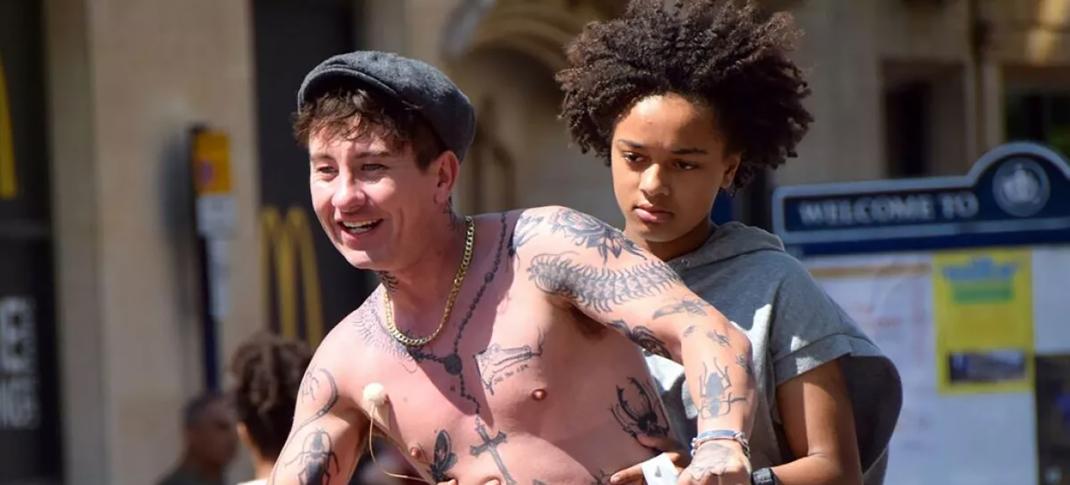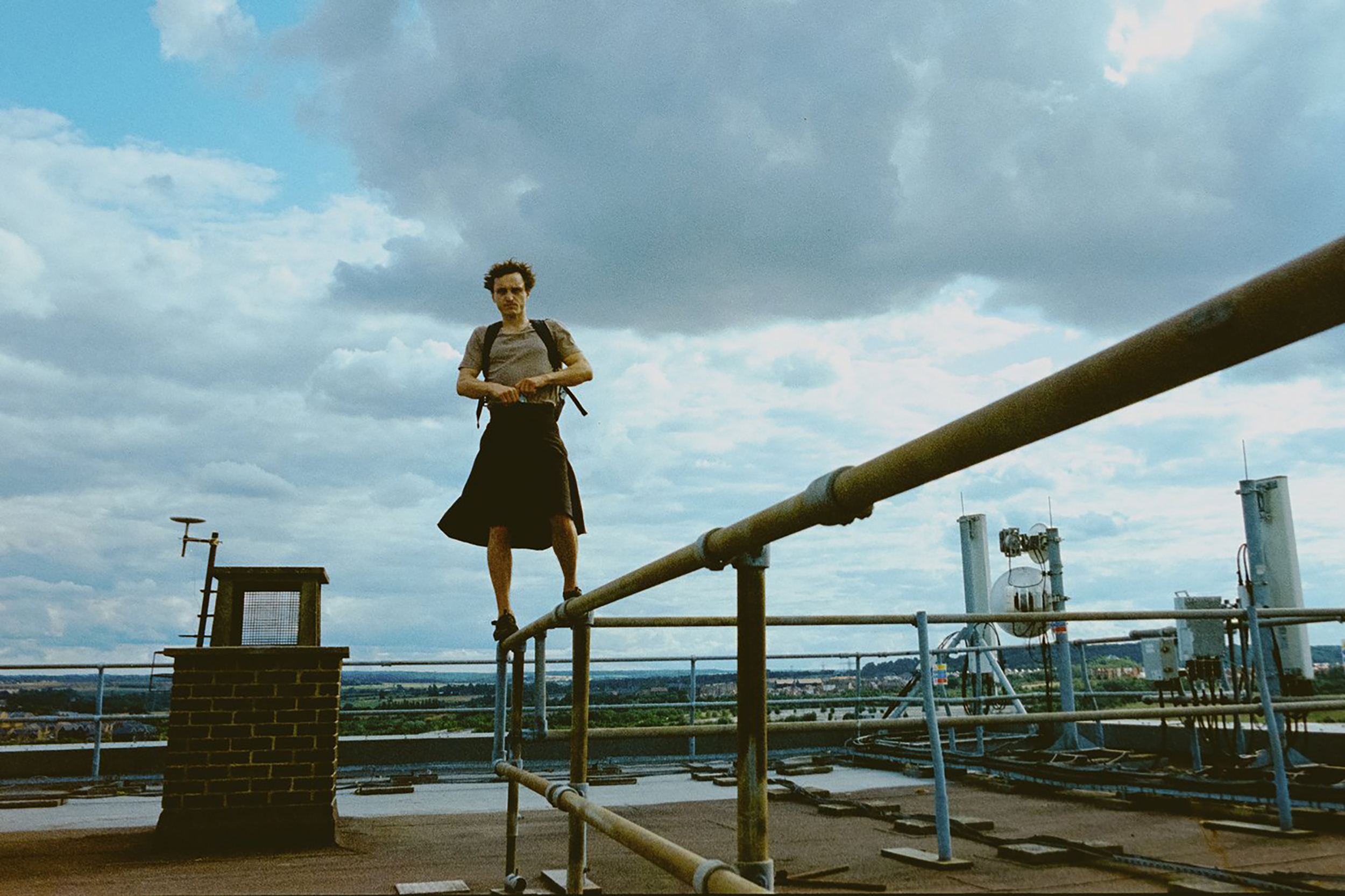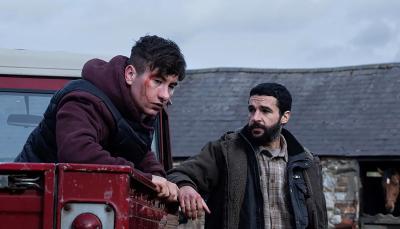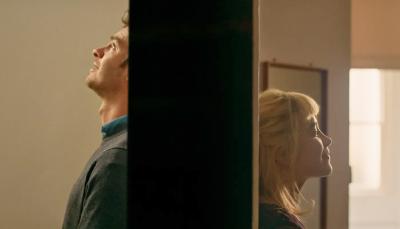Despite Flaws, 'Bird's Magical Realism Reaches Transcendence

Barry Keoghan as Bug, Nykiya Adams as Bailey in 'Bird'
Robbie Ryan/Mubi
Andrea Arnold sits in an exciting but complicated position in British film; her small filmography has significantly influenced the next generation of independent British filmmakers (predominantly female directors), but her work is not readily financed and, it turns out, difficult to produce. It may explain why it’s taken eight years since her last fiction feature, after nearly a decade working with less autonomy on American television and making Cow, a minimalist, atmospheric documentary about a day in the life of a dairy cow (where there was no chance of creative meddling).
But Arnold’s vision doesn’t take well to interference or restrictions, as they usually involve building characters around non-professional actors and embracing spirited and chaotic instincts on set. Her latest film, Bird, was beset with more setbacks than her previous films. Although you can see signs of a cluttered script and rushed production in her Gravesend-set social drama, the dream team of Arnold, Robbie Ryan (the cinematographer on nearly every Arnold film since 2003), and editor Joe Bini blend dream-logic, handheld cinema vérité, and a range of small, competing screens and cameras to tell the story of Bailey (Nykiya Adams), a 12-year-old living between two impoverished sides of her family.
Bailey is fighting for attention and respect from her re-engaged dad Bug (Barry Keoghan) while cautiously working out if she can return to her mother Peyton (Jasmine Jobson) and younger siblings, whose new boyfriend Skate (James Nelson-Joyce) brings a dangerous, violent presence to the house Bailey left. When she meets a strange, accented drifter named Bird (Franz Rogowski) in search of long-lost parents, her curiosity leads to a quest to heal his familial grief – perhaps so she can prove to herself that lost people can rediscover a home that wants them.
Like Arnold’s best films, Fish Tank, Red Road, and American Honey*, Bird feels spontaneous but also carefully considered. The film is most confident and engaging when Arnold, Ryan, and Bini apply their creative energies to Adams’ reactive and sparky lead performance. The young actor channels a restless, rebellious energy, mirrored by the frenetic camerawork and editing, as her father refuses to consider her feelings and older boys (read: 14-year-olds) dismiss her, organizing vigilante raids on wrong ’uns in the neighborhood.
*(It’s worth noting that Arnold has disowned her divisive 2011 Wuthering Heights adaptation starring Kaya Scodelario and James Howson.)
Coursing through Bird – in the extended shots of Bailey lying still as the world revolves around her or the hectic way she navigates shared homes and housing estates – is a contradictory blend of lively connection and keen displacement. Arnold’s searing dramas are always grounded in their narratives, but are driven by a propulsive style more than most social realist works. Her willingness to map out a young feminine experience, often volatile or in flux, gives Fish Tank and American Honey a dramatic and visual grit balanced by deep, committed empathy.
But while those films build the momentum of their female protagonist’s agency (both orbiting around a toxic man who will inevitably hurt them), Bird clashes Bailey’s moody, vignetted arc with Bird’s half-realized, plot-driven detective mission. More than once, Arnold’s film stops a scene so exposition can be passed between characters, and the intrusion of a thin story in a movie that relies mainly on the senses can be jarring.
In Arnold and Adams’ hands, Bailey’s tricky relationship with her own neglect and gender – refusing to wear a sparkly, girly bridesmaid outfit, cutting her hair to a short, boyish length to spite her future stepmom – feels like it drives Bailey from moment to moment, away from difficult situations and towards a short-term sense of freedom. But most of the plot responsibilities are placed on other characters until deep into the third act, and even though Bailey channels her frustration into helping her eclectic, skirted older friend, Bird suffers from blurring its emotional stakes and too keenly telegraphing how we’re meant to feel.
There are only a handful of scenes where Bailey herself is invited to heal – one scene that softens the tension between Bailey and Kaleigh takes place far too early, in the first half of the film – and too often, she stands guard by Bird or her older half-brother Hunter (Jason Buda), encouraging them to find catharsis that’s more specific than what she gets herself. Still, the fact that Bailey’s journey is primarily internal shouldn’t be discouraged. Arnold ably shows how Bailey’s fierce protectiveness holds her back from being vulnerable herself, and her pent-up distress makes the sharp bursts of magical realism in Bird’s final movements feel almost transcendent.
Joining her in her loneliness is an atmospheric score by reclusive electronic artist Burial; the sparse synthetic melody and scratchy recording texture feel like the aching, yearning expression of someone who represses their emotions. Bird’s merits outweigh its flaws, but only because Arnold seems aware of her film’s shortcomings and works overtime to correct them elsewhere in the movie. The result is a work of faulty storytelling but electric performances and a unique insight into social and personal distress.
Bird is playing in limited release in U.S. theaters and is expected to come to streaming in early 2025.






